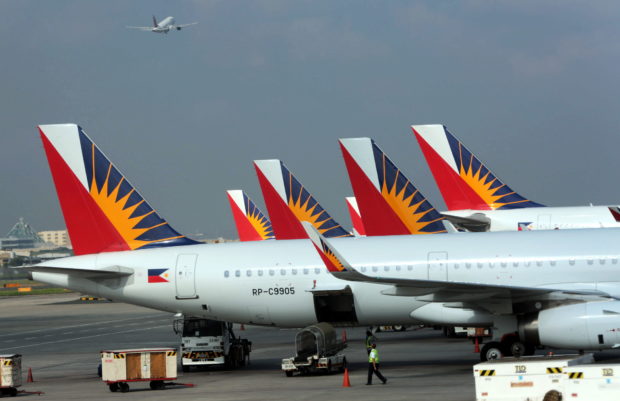
(GRIG C.MONTEGRANDE / INQUIRER file photo)
MANILA, Philippines – Philippine Airlines (PAL) has won the “overwhelming” backing of creditors in its US Chapter11 petition, which will remove debts worth $2.1 billion and pave the way for its recovery amid the ongoing pandemic.
PAL said in a statement on Saturday that the US Bankruptcy Court of the Southern District of New York approved its plan of reorganization, a key part of its Chapter 11 plea filed last Sept. 3.
“Today’s court approval represents a critical moment in our journey to emerge as a stronger airline. We are thankful for our loyal customers, dedicated employees, and the support of our shareholders and partners and government, which has enabled us to move efficiently through the process and reach this milestone,” Gilbert F. Santa Maria, PAL president & chief operating officer, said in the statement.
According to PAL, the plan was accepted by “100 percent of the votes cast, which were from PAL’s primary aircraft lessors and lenders, original equipment manufacturers and maintenance, repair, and overhaul service providers, and certain funded debt lenders.”
Through the process, PAL has also received the full support of billionaire-owner Lucio Tan, who has committed the back the airline via $505 million investment from equity and debt sources.
With the US Court’s approval, PAL said it would emerge from the court-supervised Chapter 11 process before the end of 2021.
“We have a few more procedural steps to take before we can complete the Chapter 11 process, after which we will focus intensely on serving the public, navigating the continuing challenges of the pandemic and economic recovery, and sustaining the links that connect our archipelago,” Santa Maria added.
Weighed down by growing financial losses even before the pandemic, PAL was forced into survival mode when the global health crisis emerged in early 2020.
Before filing its Chapter 11 plea, PAL had overall assets of $4.1 billion and $6.07 billion in liabilities with cash and its equivalents amounting to $31.9 million.
Under the plan, PAL will also reduce its fleet size by about 25 percent and cancel unprofitable ultra long-haul routes.
PAL continues to operate flights to 32 international and 29 domestic destinations from its hubs in Manila, Cebu and Davao.
“Following implementation of the plan, PAL will be better positioned to capture travel demand and serve the needs of global citizens, actively contributing to the Philippine economy,” PAL said.